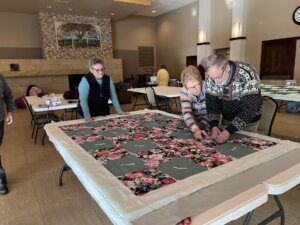Faith a part of building strong communities: Pastor Mark Kvale
March 18, 2024
| By La Crosse Community Foundation |
Building social capital second nature to faith communities
Pastor Mark Kvale, who leads English Lutheran Church in La Crosse, Wisconsin, knows the role of faith in helping build strong communities. It’s more than just religious beliefs; it’s a foundation for shared values and principles that bond communities.
Kvale’s approach to faith is rooted in inclusivity and communal care. As a result, English Lutheran Church, like many other faith communities in the area, has created a hub for social interaction and mutual aid, both of which are important elements in building social capital. This includes embracing diverse identities and addressing critical social issues such as hunger and homelessness.
As expected, the philosophy strengthens the internal church community but also extends its impact into the wider society. Kvale’s commitment to faith as a communal, rather than individual, experience demonstrates the powerful role of third places and shared values in nurturing trust, reciprocity, and a sense of belonging.
How can faith and social engagement strengthen a sense of community?

Pastor Mark Kvale of English Lutheran Church ties quilts with the church’s quilting group. The quilts are distributed throughout the world.
Sometimes, people looking at those of us who are Christian assume that our faith is all about individuals, that salvation is about eternal salvation and not experiencing help and healing in the here and now; likewise, that a person’s faith is all about one’s singular relationship with Jesus. Where in truth, the Biblical witness is truly all about community. Jesus’ teachings and actions bear this out; the parable of the Good Samaritan, Matthew 25, where Jesus says that when we tend to the least and lowly, we are caring for and loving not only our neighbors but himself as well. In the story of Jesus feeding the 5,000, his disciples are invited to share in the caring of the multitudes. The word ‘church’ comes from the word that means ‘gathering’ or ‘assembly.’ When we are part of a community, we are part of something so much larger than just ourselves. We are part of the body of Christ.
What universal values build and sustain community across diverse cultures and faiths?
Many of us have been raised knowing the ‘golden rule,’ doing to others as we would want done to us. It is amazing to me to know that almost all faith traditions have their own variations on this theme. Islam, Buddhism, Hinduism, Judaism, Christianity and so many more contain in their wisdom and scripture teachings that reflect this universal truth. Those of us who follow Jesus see Jesus as Immanuel, which means God with us. For me, that means that God is not just with me but all of humanity, and not just human beings, but all of creation. Everything is all part of God’s loving creation deserving reverence and care and love.
How can social capital positively impact local social issues and needs?
Making a difference in our communities, both the community of English Lutheran Church and the communities in which we live, are central to the members of this congregation. It is important to us to be a third space where people who come through the doors of our building are welcomed and loved for who they are. We are in the process of discerning becoming a “Reconciled in Christ” congregation, where diversity of sexual orientation, gender identity, race, ethnicity, age, economic status, marital status, physical or mental ability are celebrated and welcomed. Issues of hunger, homelessness, public health are daily front and center in this congregation. We also believe in providing space where important issues are addressed and discussed. Lastly, members of English Lutheran Church understand that their God-given gifts are to be used in their daily lives and that our members are deeply involved in servant leadership throughout the communities where we live.
Reprinted with permission from the La Crosse Tribune.
